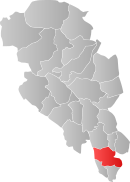Gran, Norway
| Gran kommune | ||
|---|---|---|
| Municipality | ||
| View of Jaren in Gran
View of Jaren in Gran
|
||
|
||
 Gran within Oppland |
||
| Coordinates: Lua error in package.lua at line 80: module 'strict' not found. | ||
| Country | Norway | |
| County | Oppland | |
| District | Hadeland | |
| Administrative centre | Jaren | |
| Government | ||
| • Mayor (2007) | Inger Staxrud (GBL) | |
| Area | ||
| • Total | 756 km2 (292 sq mi) | |
| • Land | 658 km2 (254 sq mi) | |
| Area rank | 143 in Norway | |
| Population (2010) | ||
| • Total | 13,363 | |
| • Rank | 82 in Norway | |
| • Density | 20/km2 (50/sq mi) | |
| • Change (10 years) | 4.2 % | |
| Demonym(s) | Gransokning Granasokning[1] |
|
| Time zone | CET (UTC+1) | |
| • Summer (DST) | CEST (UTC+2) | |
| ISO 3166 code | NO-0534 | |
| Official language form | Bokmål | |
| Website | www |
|
|
|
||
<phonos file="De-Gran.ogg">Gran</phonos> is a municipality in Oppland county, Norway. It is part of the traditional region of Hadeland. The administrative centre of the municipality is the village of Jaren. There is also a village of Gran located within the municipality.
The municipality of Gran was established on 1 January 1838 (see formannskapsdistrikt). Brandbu was separated from Gran on 1 January 1897, but it was merged back into the municipality of Gran on 1 January 1962.
Contents
General information
Name
The municipality (originally the parish) is named after the old Gran farm (Old Norse: Grǫn), since the first church was built there. The name is identical with the word grǫn which means "spruce".[2]
Coat-of-arms
The coat-of-arms is from modern times. They were granted on 11 December 1987. The coat-of-arms is red with two gold triangles stretching upwards with a bottony cross on the tip of each triangle. It is meant to represent the spires of the medieval Sister Churches which are located in the municipality. The arms were designed by Kari Ruud Flem from Jevnaker.[3]
History
Granavollen is the site of the Sister Churches (Norwegian: Søsterkirkene), two stone churches from the Middle Ages. They are constructed side by side. The smaller and older is the Mariakirke, a single nave church built in the Romanesque style. The neighbouring Nikolaikirke is a three-aisled basilica, probably inspired by the construction of the St. Halvardskirke in Oslo. According to local folklore, the churches were built by two sisters. These two detested each other so much they could not share the same church. A more likely explanation however, is that the Mariakirke was built for the local congregation, while the Nikolaikirke was the main church for Hadeland parish. The Granavollen stone is located behind the Nikolaikirken.
At Tingelstad, there is another medieval stone church. It is dated to the 12th century and is called the Tingelstad old church. This church has survived even though it has not been in regular use for some 140 years. This is also the location of Hadeland Folkemuseum with a collection of buildings from the area, farm implements as well as a grave mound from the Viking Age and a copy of the 11th century Dynna stone. It also holds an archive of photographs and documents.
Economy
The economy of the municipality was in 2002 of NOK 24,098 in free income per inhabitant, and net debt per inhabitant was NOK 41,835 (also municipal economy, not private). Health care spendings represents about one third of the total budget, which is 7.5 per cent higher than the average for Norway.
Geography
Gran is part of the Hadeland region. It is bordered to the north by the municipalities of Søndre Land and Vestre Toten, to the east by Hurdal and Nannestad, to the south by Lunner and Jevnaker, and to the west by Ringerike. Areas of concentrated population include Moen, Brandbu, Gran, and Jaren.
Sister cities
The following cities are twinned with Gran:[4]
 - Favrskov, Region Midtjylland, Denmark
- Favrskov, Region Midtjylland, Denmark - Kungsbacka, Halland County, Sweden
- Kungsbacka, Halland County, Sweden - Lugazi, Kampala District, Uganda
- Lugazi, Kampala District, Uganda - Mukono, Mukono District, Uganda
- Mukono, Mukono District, Uganda - Pärnu, Pärnu County, Estonia
- Pärnu, Pärnu County, Estonia - Saarijärvi, Länsi-Suomi, Finland
- Saarijärvi, Länsi-Suomi, Finland
References
External links
| Wikimedia Commons has media related to Gran, Oppland. |
| Look up Gran in Wiktionary, the free dictionary. |
- Municipal fact sheet from Statistics Norway
 Oppland travel guide from Wikivoyage
Oppland travel guide from Wikivoyage- Official website of Gran (Norwegian)
- Hadeland Folkemuseum (Norwegian)
- Raukr Viking Centre

